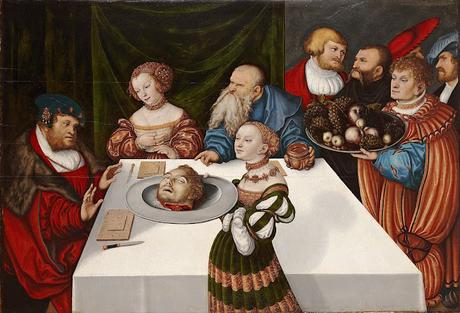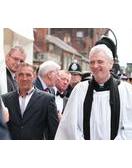There is Herod and the sin.

It is celebrity scandal in the highest places
Herod Antipas (not to be confused with Herod the great who tried to have the baby Jesus murdered) was married to the daughter of Aretas IV, king of neighboring Nabatea. But when he was in Rome – he was a drinking buddy of the future emperor – he met Herodias, who was married to his brother Philip, and they hooked up together. When Herod’s wife back in Judaea heard the news, she fled back to Petra and to her father’s fortress. Herod then married Herodias, and Aretas went to war with Herod and Judaea over the slight to his daughter.
It was a mess. A child was involved – Salome – the daughter of Herodias and Philip, and whatever happened at the dance that she does for Herod and his mates on his birthday, it would almost certainly today be considered to be sexual abuse of a child – used by both mother and stepfather.
And not only was Herod and Herodias’ behavior a direct contravention of the Old Testament law (Leviticus 18:16), but it included betrayal and abandonment.
And from what we know of the characters of the Herod dynasty, and of Herod Antipas (and we do know quite a bit not only from the Bible but also from the contemporary Jewish historian, Josephus) – and in particular the rash promise given to the daughter of Herodias – it does not seem that Herod’s divorce and marriage to Herodias was a political decision, a bit like Henry VIII, but it was an impulse thing. It was a love thing, or – perhaps showing my cynicism – it was a sex thing.
Of course this sort of stuff doesn’t happen today!!
We see it on our screens: which celebrity has dumped their present partner for someone else. We see it in the foreign community. People come here, divorce their wives and marry a younger model, who offers them a new life.
But for those of us who have not been there, it is easy – even if we don’t say it – to think that we are superior.
But this sort of stuff could be any of us.
The danger comes when we think that this sort of sin cannot touch us.
George MacDonald was a leading Christian writer and speaker, who wrote a book called ‘Ordering your private world’. It is a good book about ordering your private world!
After he had written the book, he was asked how the devil would attack him. He replied, in all integrity, that he didn’t know, but he knew that it would not be through his personal relationships. Within a year he was having an affair with his secretary. He writes about it in a second book, which is far far better: ‘Rebuilding your broken world’.
Paul writes, “So if you think you are standing, watch out that you do not fall”. 1 Corinthians 10:12
And if we are honest, I suspect that there are many of us who, even if we have remained faithful, cannot say that we have not had the desires to stray – and possibly the only reason that we have not acted on them is not because we are more virtuous or disciplined than others, but because we are so cautious, so fearful of being out of control, that we stop living. We turn self-control into a little god.
And it stops us from extravagant love in the right way.
I’ve started to discover a little bit about Mother Maria Skobtsova, a Russian noblewoman, exile, poet, theologian and nun. She was someone who loved extravagantly, without caution, at times foolishly, in the right way. She had an open door to refugees, the needy and the lonely. During the war she was part of the French resistance, gave shelter to Jews, was arrested and sent to the gas chamber.
And then there is the preacher.
We see the courage of John
He challenges the ordinary and he challenges the politically powerful.
I notice that he chooses to challenge Herod about personal morality and not about social policy.Often the Church is quick to criticize political leaders for social policy but not for personal morality.
But the two cannot be separated.
The lifestyle of rulers, monarchs and political leaders is important – not only because it impacts on decisions that they make – but because it sets a tone for society. If a king, if a minister of the crown does it, then it is ok for ordinary me to do it.
And John – with incredible courage – challenges Herod.
He did it knowing that it would cost him his life.
One thinks of Ambrose who challenged Emperor Theodosius in 390, after Theodosius had discriminately ordered the massacre of 7000 citizens in Thessalonica after a riot.
One thinks of Chrysostom, courageously challenging the lifestyle of the court, and especially the empress, for which he was exiled
One thinks of Thomas More who refused to accept King Henry’s divorce because he said it was wrong. And he paid for it with his life.
But also note - and this is important- that John does not condemn Herod.
He does not tell him that he is damned to hell.
He does not say you should not be ruler because you have sinned.
All he does is expose the truth. He simply says that what Herod has done is wrong before God: “It is not lawful for you to have your brother’s wife.”
And notice the ‘you’ in this statement. He doesn’t write a newspaper article shaming Herod. He doesn’t preach a sermon, naming and shaming Herod. He does something much harder. He goes to Herod personally and says, ‘It is not lawful for you to have your brother’s wife’.
And then we see how sin leads to more sin, if there is no repentance.
Herod, in his heart of hearts, knows that what he has done is wrong.
He has a guilty conscience.
But – and this is the key thing - he doesn’t do anything about it.
He doesn’t leave Herodias, and/or he doesn’t repent.
Herod hedges his bets.
He has John locked up, to prevent him causing trouble – especially given that he is fighting a war with the Nabateans - and likes to listen to him (although one of the other gospels says that this is because he is looking for a bribe) – but he will not act on what John is saying.
And he ends up doing something far worse than committing adultery with his brothers wife.
He has John murdered.
Sin leads to sin. It reminds us of King David.
He committed adultery with Bathsheba, and then to cover it up he gave instructions that would lead to the death of Bathsheba’s husband. He had him murdered.
But there was a huge difference between David and Herod.
Because when Nathan the prophet did a John the Baptist and spoke to David and exposed what he had done and declared God’s judgment on him, David heard.
He knew that he had done wrong, but – unlike Herod – he genuinely repented.
Divorce happens.
It is wrong, except in a few exceptions. Jesus speaks about the adultery of the other, and I think that also covers wider abuse even where adultery has not happened.
But divorce is usually wrong. It offers too easy an option – rather than face up to difficulties we run into a new relationship, it breaks vows we have made and makes our word nothing, it betrays trust, it messes up people. It breaks children.
But when it is recognised to be sin, when there is the conviction - and for some of you that may be happening now - it does not necessarily mean that you should leave your new partner (David did not abandon or leave Bathsheba after seducing her), but you do need to come to God, recognize that what happened was not right, and seek his mercy and forgiveness, accept the consequences and recommit yourself to living for God in the light of what has happened - both in the current relationship and perhaps (and I would ask you to hear this with some caution because I’m not sure that it is as simple as this) in loving your former partner in a more genuine way than you did when you were with him or her, in a Mother Maria sort of way – not to make up for the betrayal (you can’t do that), not to make atonement (you can’t do that) – but unselfishly, recognising the new situation, and doing what you can for them - not for what you can get from them, but for their sake. And maybe the only thing that you can do is to accept their anger against you, their refusal to let you see the children, and to pray.
Most of us don’t have the power to lock up an uncomfortable preacher.
But we do have the power to lock up our conscience when God begins to speak to our hearts and minds.
We can reject the message, reject the word of God, or we can twist it so that it says what we want it to say – but, like Herod, that will lead to deeper sin.
Or we can listen to God’s word, repent of what is wrong, seek to put right what we can, and to live in the light of God’s outrageous mercy, forgiveness, purpose and love.

